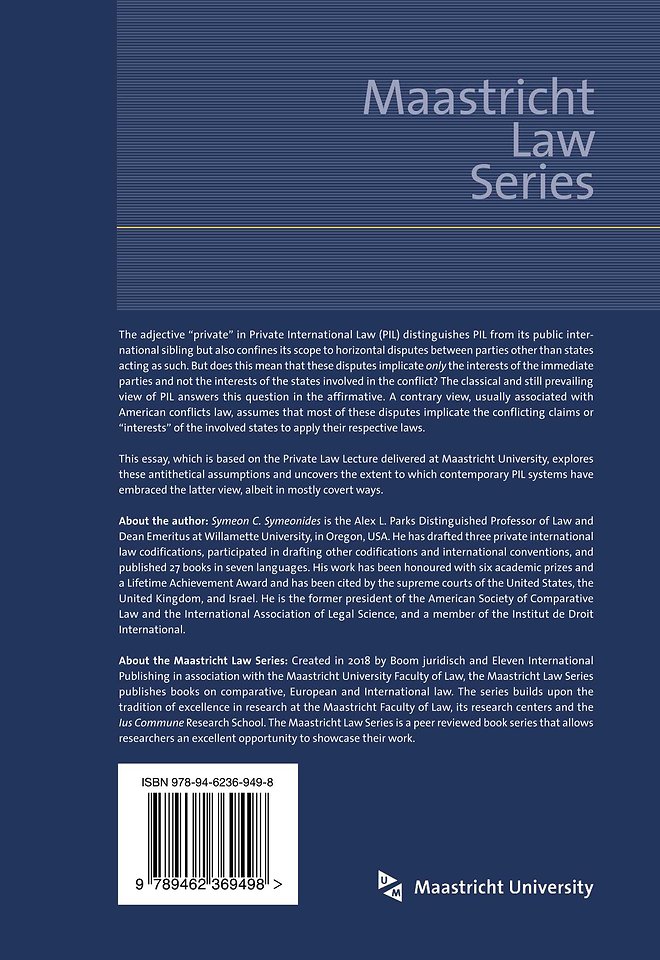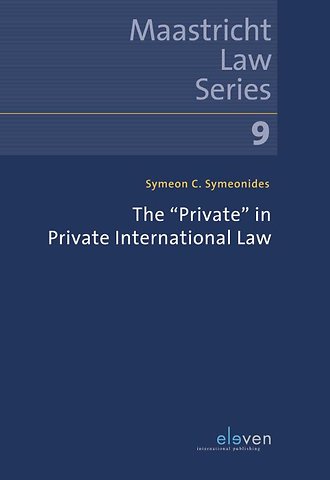The “Private” in Private International Law
Samenvatting
The adjective “private” in Private International Law (PIL) distinguishes PIL from its public international sibling but also confines its scope to horizontal disputes between parties other than states acting as such. But does this mean that these disputes implicate only the interests of the immediate parties and not the interests of the states involved in the conflict? The classical and still prevailing view of PIL answers this question in the affirmative. A contrary view, usually associated with American conflicts law, assumes that most of these disputes implicate the conflicting claims or “interests” of the involved states to apply their respective laws.
This essay, which is based on the Private Law Lecture delivered at Maastricht University, explores these antithetical assumptions and uncovers the extent to which contemporary PIL systems have embraced the latter view, albeit in mostly covert ways.
About the Maastricht Law Series: Created in 2018 by Boom juridisch and Eleven International
Publishing in association with the Maastricht University Faculty of Law, the Maastricht Law Series
publishes books on comparative, European and International law. The series builds upon the
tradition of excellence in research at the Maastricht Faculty of Law, its research centers and the
Ius Commune Research School. The Maastricht Law Series is a peer reviewed book series that allows
researchers an excellent opportunity to showcase their work.
Trefwoorden
Specificaties
Inhoudsopgave
I The Privateness of PIL 1
A The Continental View 1
B American Perspectives 4
C The Outlier: Brainerd Currie and State Interests 6
II PIL and State Interests 9
A Do States Have an Interest in Multistate Disputes between
Private Parties? 9
B Are State Interests Ascertainable? 11
C Re-conceptualizing State Interests 15
D Can an Interest-Based Approach Rationally Resolve Conflicts?
1 False Conflicts 16
2 True Conflicts 16
3 No-Interest Cases 19
E Summary 20
III Not “Only in America”: Recognition of State Interests Elsewhere 21
A Not for Export 21
B The Obvious: Unilateralist Tools 22
C The Less Obvious: Multilateral But Non-Neutral Rules 23
D Constitutionalization of PIL 27
Conclusions 29
Anderen die dit boek kochten, kochten ook
Net verschenen
Rubrieken
- aanbestedingsrecht
- aansprakelijkheids- en verzekeringsrecht
- accountancy
- algemeen juridisch
- arbeidsrecht
- bank- en effectenrecht
- bestuursrecht
- bouwrecht
- burgerlijk recht en procesrecht
- europees-internationaal recht
- fiscaal recht
- gezondheidsrecht
- insolventierecht
- intellectuele eigendom en ict-recht
- management
- mens en maatschappij
- milieu- en omgevingsrecht
- notarieel recht
- ondernemingsrecht
- pensioenrecht
- personen- en familierecht
- sociale zekerheidsrecht
- staatsrecht
- strafrecht en criminologie
- vastgoed- en huurrecht
- vreemdelingenrecht









